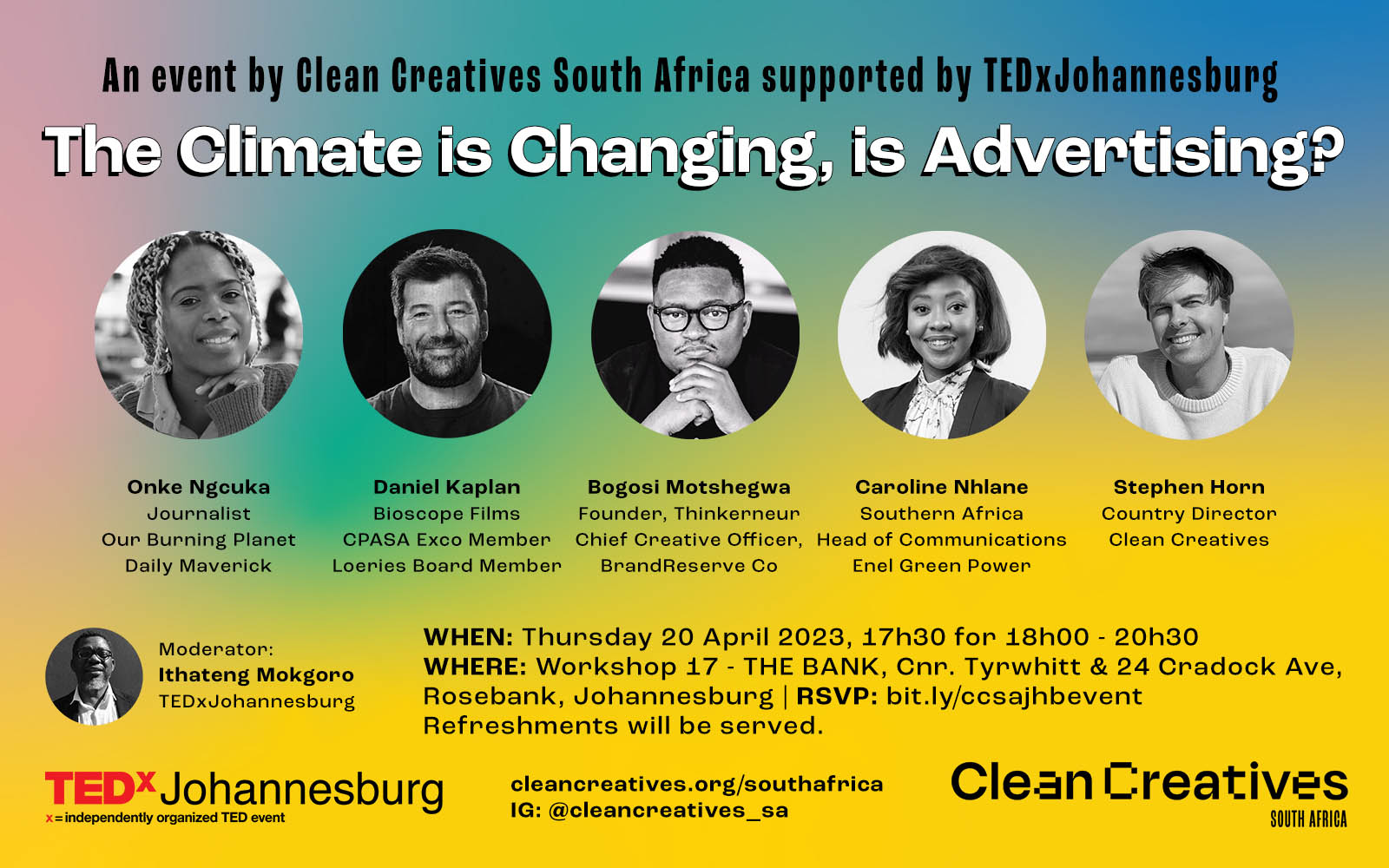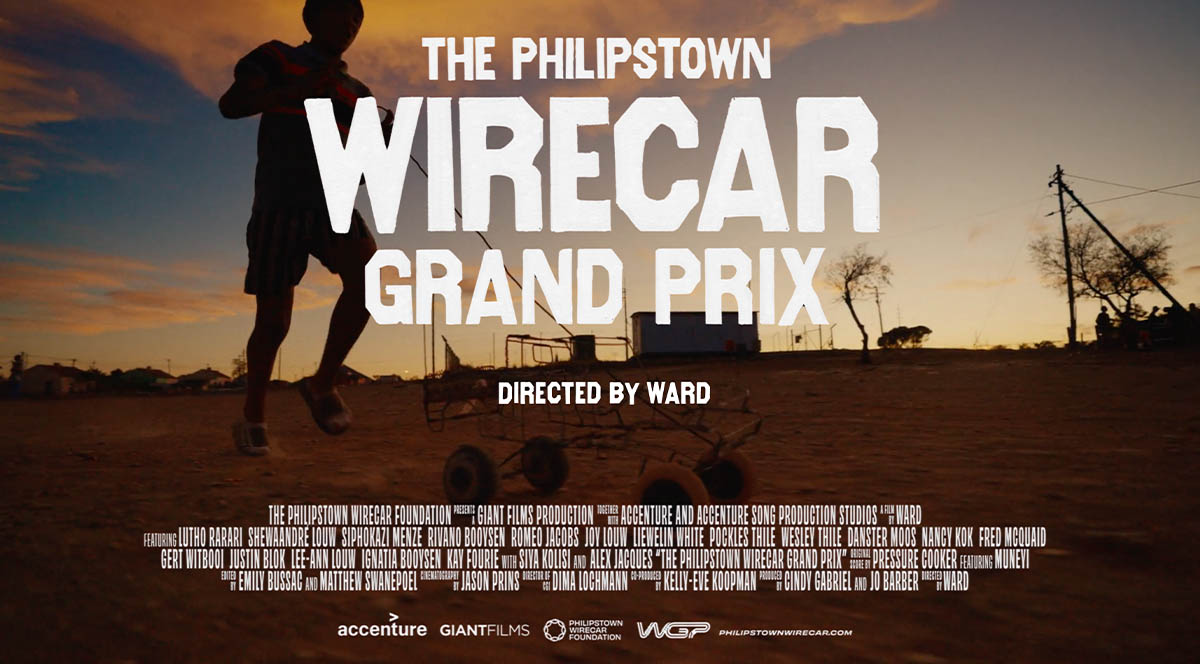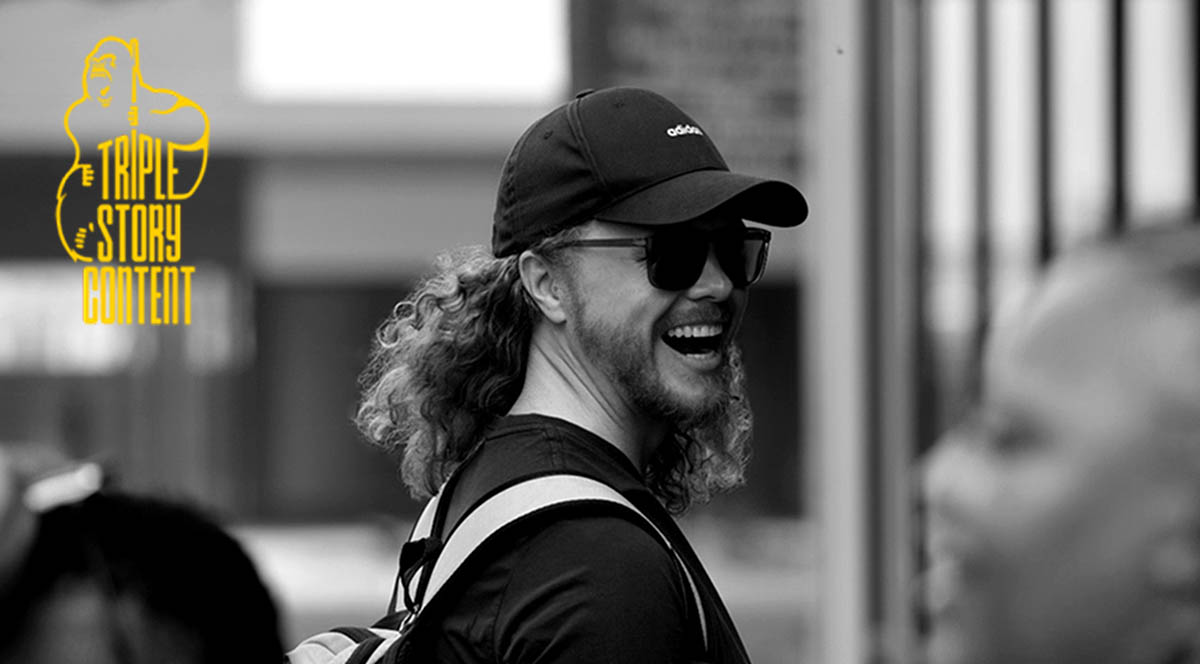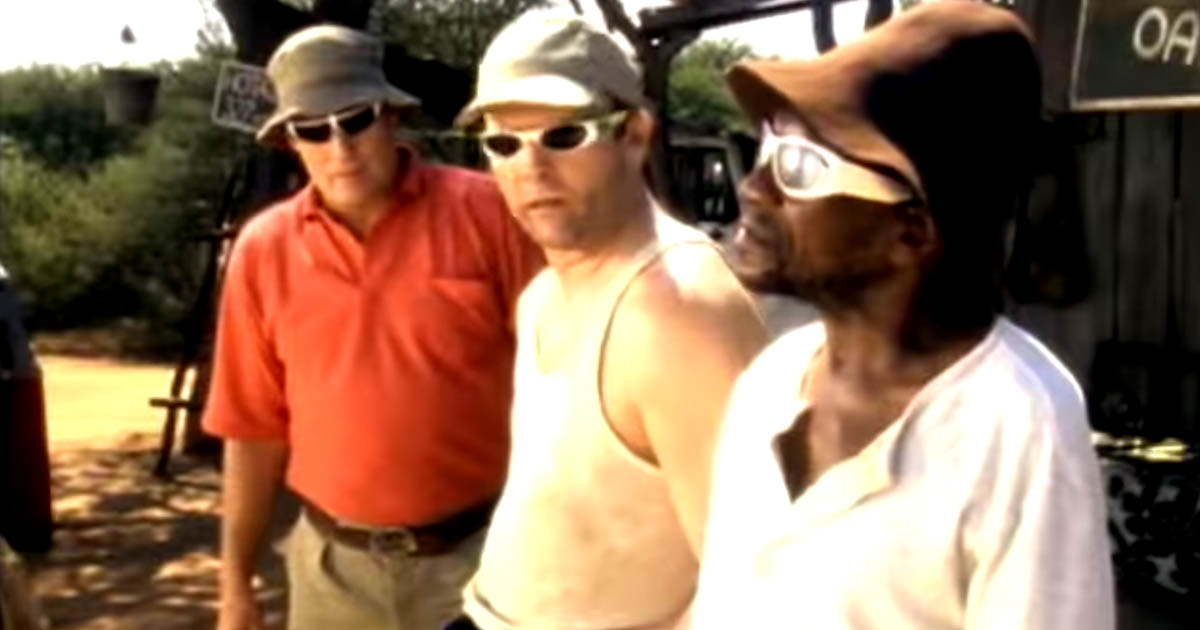
The characters of Boet and Swaer in the iconic Castrol TV adverts for engine oil.
Clean Creatives is asking South Africa’s creative industry to stop using your talents to advertise for fossil fuel companies
Clean Creatives is a movement advocating for the Advertising, PR and Production industry to decline work from the fossil fuel industry (think Sasol, BP, Engen, Shell, and Caltex for example). Their aim is to mobilise creatives in South Africa to stop using their talents to promote fossil fuel companies and to create a conscience around working for companies that are speeding up the rate of climate change. Here are some of the questions we had, before coming clean.
When IDIDTHAT initially met with Clean Creatives, we had never considered the relationship between advertising and climate change and then the penny dropped. To be fair, we thought Greta had it all under control and that Paris had agreed to something. Founder of IDIDTHAT and only some-of-the-time recycler, Julie Maunder said: ‘We’ve heard this a lot in our line of work – ‘We’re not saving lives, it’s just advertising.’ However, what ad creatives have is the ability and talent to shape perceptions and that is incredibly valuable. We have the power to make people feel things, our storytelling can change minds and ideas. That’s powerful. Now we have to ask ourselves, are we doing this for the right brands and to what end?’

In 2019 it was reported by Adtrack, Kantar’s proprietary advertising testing system, that Sasol ‘Ama-Glug-Glug’ created in 1999, has remained South Africa’s Best Liked Ad ‘of all time’. Yup, it’s a great ad, but it has also resulted in audiences having positive associations with this brand. (In fairness to the creative team, in 1999 climate change wasn’t exactly the ‘hot topic’ it is now.) Ads like these create positive brand perceptions that distract from the climate activism work that will lead to legislation that will stop these companies.
Why is advertising for fossil fuel companies bad?
Think about some of the fossil fuel ads we see these days, they often use greenwashing, showing things we like; solar panels, windmills, green pastures, kids with butterflies, people laughing or science stuff to convince us that they are working toward becoming a net-zero emission company. The reality is literally the opposite. These companies still invest almost all their earnings on more oil and gas. They are building new pipelines and refineries and drilling wells that are expected to be used for the next 40 years. They need a demand for that, which is why they use clever marketing to distract and obstruct policies that could affect their ability to sell oil and gas.

Left BP, Middle Caltex, Right Total Energies
‘Research has shown that fossil fuel company PR and advertising green claims do not match how their businesses operate and are planning to continue operating in the future. This misleading branding creates a false sense of security, deceiving the public into thinking they are transforming their businesses to be responsible towards the planet but nothing could be further from the truth.’ Says Stephen Horn, Country Director, Clean Creatives SA
Clever marketing works. Throwback to some obvious examples in South Africa’s case. Think of all the warm fuzzy feelings you get when remembering some of the Boet and Swaer ads for Castrol, Sasol’s AmaGlug-Glug campaign which we’ve mentioned or BP’s Beyond Petroleum.
Getting a brief on your desk for these companies in the past was a dream for a creative and a real opportunity to do award-winning work. Is that how we should be feeling now, knowing what we know? We never had a conscience about creating feel-good perceptions about fossil fuel companies in the past, because we didn’t know any better, but now we do.

So, if I stop working for fossil fuel companies we can stop climate change?
We know, climate change is one thing, but declining work when you have staff to consider, your career or your family, seems radical. It’s a struggle that’s parallel with the end of tobacco advertising years ago.
The answer is of course, yes. Yes, we can make a huge dent in stopping climate change, we’ve done it before. Take a look at this…
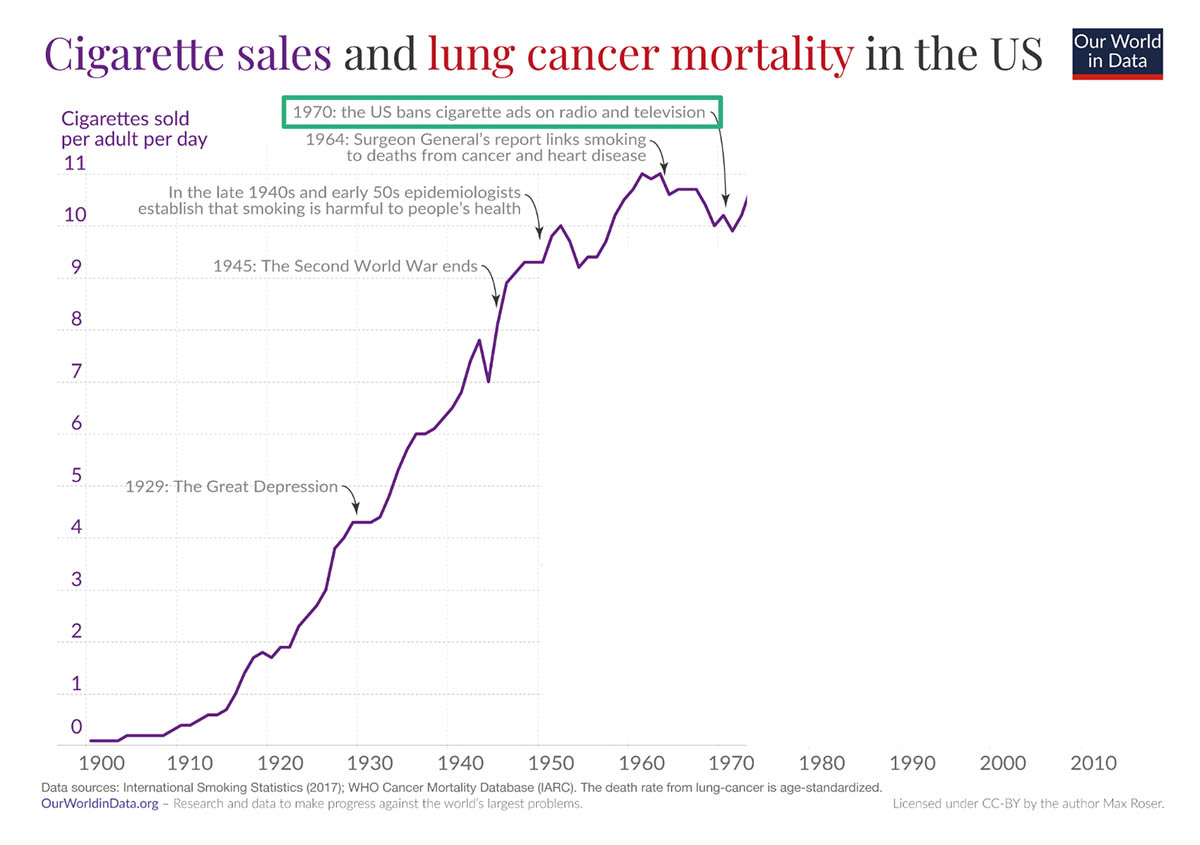
This chart shows the rate of cigarettes smoked per day and the rate of deaths from lung cancer in the US. At the top of the chart, we can see when one key decision was made in 1970: banning tobacco advertising on radio and TV. By doing so, there was a drastic reduction in the number of smokers, and ultimately, a decrease in the number of lung cancer-related deaths. (As seen in the chart below)
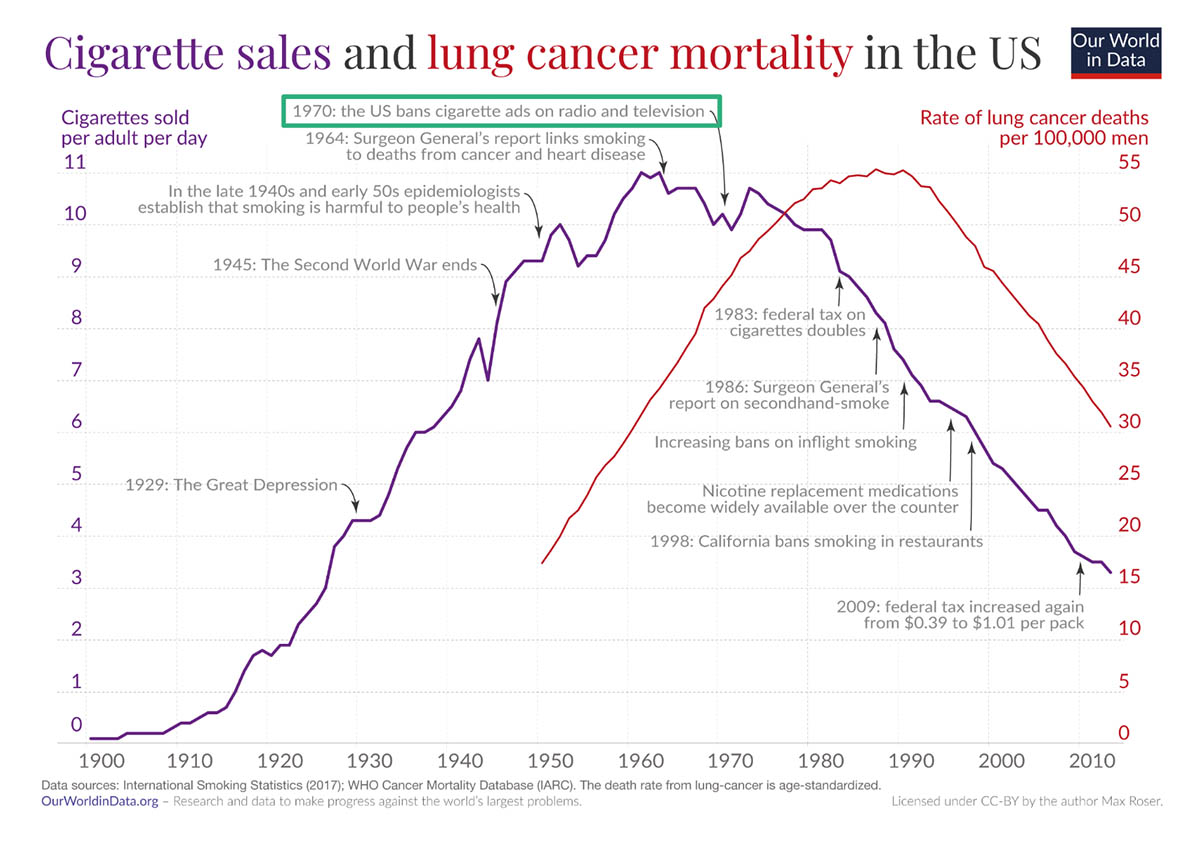
This chart shows the impact that the decision to ban tobacco advertising had. Following this decision, dozens of actions were implemented because there was a political will to move forward, and the rate of cigarette consumption decreased permanently. Basically, now you can smoke in your car or hunched over the ledge of the trashy designated smoking area on the rooftop of your building barefoot in the snow.
When tobacco advertising stopped, it led to political action, which led to new regulations. This can happen with climate change.
So, are people really gonna say no to work?
The creative industry’s marketing for fossil fuel companies does some of the most damage in hampering authentic efforts to stop climate change. BUT we are also an industry filled with some of the most progressive minds, most of whom want to create meaningful work. Therefore, this is an industry that can change. We did it with tobacco, we can do it with fossil fuels.
Janette de Villiers, founder and Executive Producer at Groundglass says of signing the pledge: “I think the most striking thing for me is to see that there are other people working in this industry who realise the urgency of our responsibility to change the messaging. It is hugely reassuring and I firmly believe we have a huge duty to turn things around on consumerism. The world can function on circular economies as can advertising, and it’s firmly up to us to change the messaging and stop big corporate greenwashing. I want to add my voice to this cause.”
At IDIDTHAT we have decided to join Clean Creatives by not awarding Best in Craft in our monthly Craft Awards to any work done for the fossil fuel industry. We believe the move is in line with where our industry is moving and it’s only a matter of time before other awards and showcases stop giving airtime to these brands.
What side of climate change do I want to be on?
Clean Creatives is asking you to decline any new business from fossil fuel companies. They’re not asking you to phone your current clients and kick them to the curb (although GO DADDY), they’re asking you not to take on any more. It’s a journey they want you to start, to be aware of the effects that your talents have on speeding up climate change and to have a conscience about climate change. Here are the steps that the creative and production industry should take.
Creative individual – work with agencies that don’t have fossil fuel contracts, or decline working on fossil fuel briefs.
Marketers and brands – only work with clean agencies that do not have fossil fuel companies as clients.
Agencies (Design, Through the Line, PR & Media) – don’t take on any future fossil fuel clients.
Production companies – don’t work on fossil fuel commercials.
Co-Founder and Director at agency AVA Tyron Kuypers, recently took the pledge to not work with any fossil fuel companies and had this to say: ‘After seeing Stephen (Stephen Horn, Head of Clean Creatives SA) and listening to his talk, it raised questions that we at AVA had had before and morally – and I think just personally – it just felt like if I didn’t make a decision now, then when would I? I’m proud of the choice we made because this is the right step that I think all creatives and all businesses need to be looking at. Why put off what can be done today, until tomorrow? And I think that resonates with your message that we need to act now because acting tomorrow is too late. So, it’s a no-brainer.’
Mark Stead, Founder and Creative Director of Derrick Agency says: ‘Since the start of Derrick our responsibility has been to deliver creative solutions that uphold sustainable tenets. The Clean Creatives pledge is in line with our philosophy and signing was a no-brainer.’
If you’re still kind of on the fence, don’t just do nothing, Clean Creatives urges you to stay part of the conversation. Now might not be the right time for you to sign the pledge but you also want to get ahead of the inevitable shift in the industry and consider your and your company’s future reputation.
If you’re in Joburg on Thurs 20 April in Rosebank, come hear a great conversation about ‘The Climate is Changing, is Advertising’ featuring moderator Ithateng Mokgoro – TEDxJoburg, Stephen Horn – Country Director Clean Creatives South Africa, Daniel Kaplan – Exec Producer, Bioscope Films / CPASA Exco Member / Loeries Board Member, Onke Ngcuka – Journalist at Our Burning Planet Daily Maverick, Bogosi Motshegwa – Founder, Thinkerneur & Chief Creative Officer at BrandReserve Co and Caroline Nhlane – Southern Africa Head of Communications, Enel Green Power. Ask questions, engage, and have a canape. RSVP HERE.
Produced by the IDIDTHAT Content Studio – Credits: Anne Hirsch (Writer) / Julie Maunder
*This content may not be reproduced or used in any part without the prior written consent of IDIDTHAT. Reprints must credit I DID THAT.co (ididthat.co) as the original publisher of this editorial piece and include a link to this site.
This Editorial is paid for by Clean Creatives. Want our studio to create content that puts your agency/company/kickass ad you made in bright lights for the whole industry to see? View or editorial packages or contact julie@ididthat.co and we’ll make it happen! #Boom

